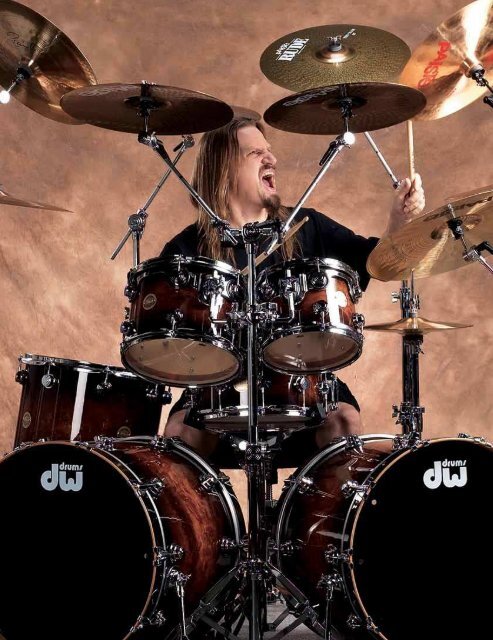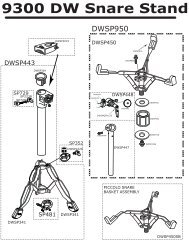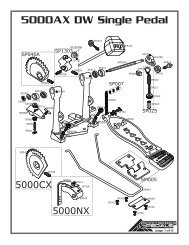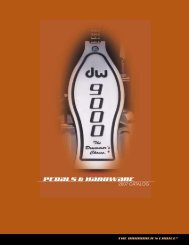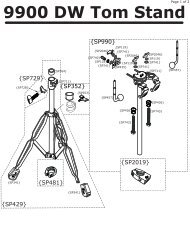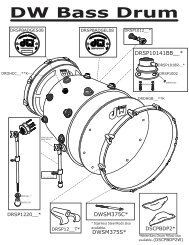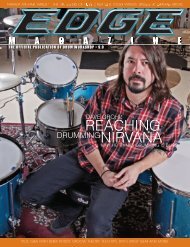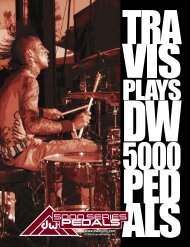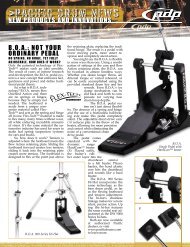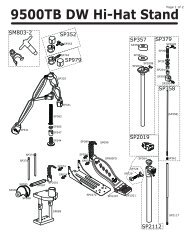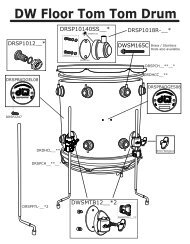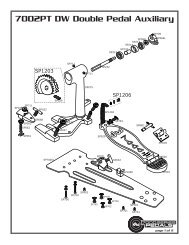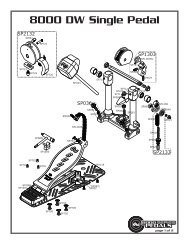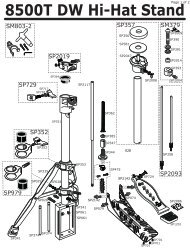Edge 7.0 featuring Peter Erskine & Alex Acuña here - Drum Workshop
Edge 7.0 featuring Peter Erskine & Alex Acuña here - Drum Workshop
Edge 7.0 featuring Peter Erskine & Alex Acuña here - Drum Workshop
- No tags were found...
Create successful ePaper yourself
Turn your PDF publications into a flip-book with our unique Google optimized e-Paper software.
BJ: Yeah, like on this new Sebastian BachCD, t<strong>here</strong>’s a few ballads. I mean, unless youcan really competently play a ballad, you’rein trouble. It’s something that you can learn,just listening to records and learning feel,not the technical side, but the feel. I meanyou really have to feel that music in order toplay like that. You have to be in those situmetalBobby JarzombekHammerHe’s the thinking man’s metal drummer, backing metalgods like Rob Halford and Sebastian Bach. this chopsinspiredspeed demon pulls out all of the tricks, whileyears of experience have taught him to still lay it downlike a metal hammer.EDGE: You’re new to DW. What made you decideto switch?Bobby Jarzombek: Well, I’ve always beenintrigued with drums and the innovativestuff that’s been coming out of DW. I’ve alsonoticed that a lot of guys have been headingover to DW, and I’ve been wonderingwhy. In looking a little further and checkingout some of the products, I thought that everythingwas cool, and the finest drums forsure. I was a little bit dissatisfied with myformer company, and that’s what led to mechecking things out. So I went out to Oxnardand checked out the whole factory and themaking of the drums. I was definitely soldon it, you know, when I saw everything goingdown. I saw the entire operation at work,with everybody involved all the way fromthe guys in the paint area with the masksover their faces to Don Lombardi at the top.I was just impressed with the whole operation,so I had to make the change.EDGE: So as a hard rock/metal drummer, youhave to have some pretty serious stamina obviouslyto make it through a show. Talk a little bitabout how you stay in shape and your practiceroutine.BJ: Well, I think it’s important to always tobe in shape to play metal drums. I mean, obviouslywhen I go into a rehearsal situation,I make sure I know the songs really well. Irun through the set on my own, just witha click track, multiple times on each song.Then, I’ll do the whole set again and again,just keeping up double bass chops, keepingup speed chops. So when you’re doinga 45-minute show, it’s like a breeze. The ideais to be relaxed up t<strong>here</strong>, but intense. So Ijust make sure that I’m in shape to play theshows.EDGE: Do you also have a workout routine thatinvolves physical training or cardio?BJ: I used to run years ago. For like twoyears, I would run steadily about three orfour times a week, you know, a few miles ata time. I did that on and off for many years.And I think it was right around the Rob Halford(lead singer for Judas Priest) “Crucible”time in 2002. We were doing rehearsals andpre-production, then were in the studio fora long time. That was such an intense time,and right around that time I quit running, Inever went back to it. Maybe it’s not a goodthing that I never did, but I still try to stay inthe same frame of mind as if I was runninga few times a week, just with my practiceroutines.EDGE: Do you have certain rudiments or footexercises you focus on when you practice?BJ: I work on what I call “concepts,” w<strong>here</strong> Ihave particular patterns that tend to evolveand become more complex patterns. Youcan take it as far as your ability and yourdrumming vocabulary allows. I have theseconcepts that I work on, and they’re intense.It might be a hand exercise or a foot exercise,but if you work on it diligently in t<strong>here</strong>hearsal room for three or four hours aday, then you’re going to get a pretty goodworkout. These concepts are not anythingspecific, just something that I happen tostumble upon, or something that I think isa cool exercise or rudiment. Sometimes it’sa stamina kind of thing or a polyrhythmicthing; it always changes.EDGE: What other styles of music have youstudied, and what other types of music have influencedyour playing?BJ: Oh, you’re going to open up a can ofphotos by Matthew Friedworms if I go t<strong>here</strong>. I grew up playing inSouth Texas, w<strong>here</strong> I’m from, San Antonio,and if you want to make a living in that areaof the country, then you have to know a lotof different styles. Obviously I grew up witha lot of heavy metal drumming and heavymetal drummers. I’m a fan of drumming,and being a working musician, I learned toplay a variety of styles. T<strong>here</strong> was a lot ofcountry music and t<strong>here</strong> was Tejano music,for example. I’ve done CDs and live showsfor years and years doing country music andTejano music. I’m a hell of a country drummer,too, by the way. I don’t know if youknew that. I’ve done quite a bit of that kindof stuff. But it’s kind of a weird mixture becauseit’s country music mixed with heavymetal music. I was part of the regular “A”team of studio players down in San Antonio,which isn’t saying a whole lot when youconsider w<strong>here</strong> San Antonio is on the musicalmap, but it was still cool. I’d also playa lot of classic rock, whatever San Antonioallowed me to do in order to make a living.I really stayed true to my heavy metal roots,though. That’s w<strong>here</strong> my passion comesfrom when it comes to drumming, and that’swhat I grew up listening to. Even then, I gothrough days w<strong>here</strong> I listen to nothing butCuban stuff, or bebop ‘50s jazz, like olderElla Fitzgerald and Frank Sinatra. I owneda lot of that stuff.EDGE: So do you feel that any of those styles ofmusic influence your rock playing?[EDGE <strong>7.0</strong>] 47


